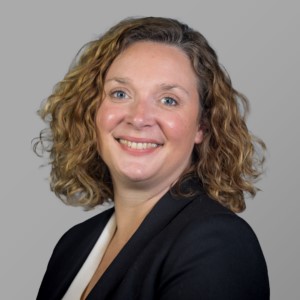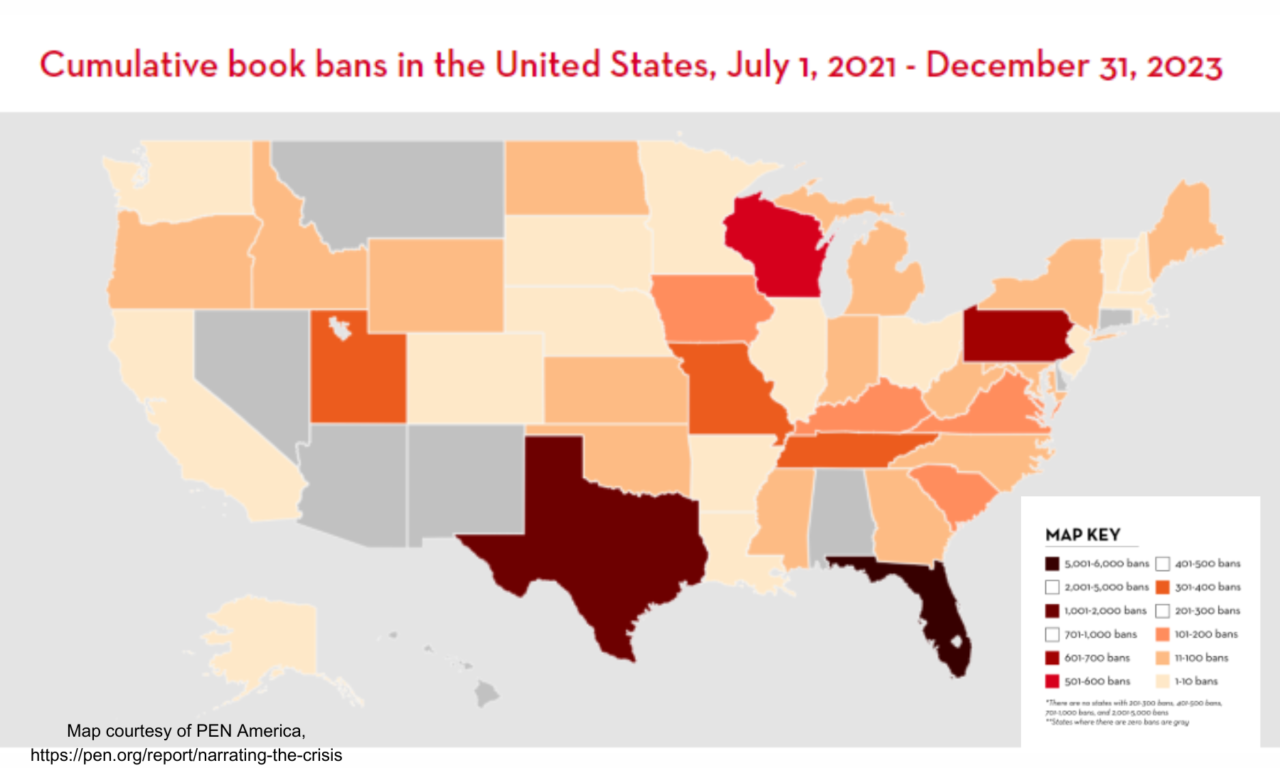As we get ready for Banned Books Week, Sept. 22-28, we had the opportunity to talk with Katie Blankenship, Senior Director of PEN America Florida. PEN America champions freedom of expression and literary excellence. The organization’s Florida office was established last year in response to an unprecedented increase in book banning and restrictive educational initiatives.

Q: What’s going on with book banning in Florida? Why is this such a big issue in the state and nationally?
A: Just last fall, 4,394 book bans were recorded across the country, with 3,135 occurring in Florida, making it the top book banning state in the country by a wide margin. (By comparison, the second most book bans, Texas, had 1,567 recorded bans last fall.) And there are no signs of this trend slowing down—we’re now up to 5,107 in Florida at the time of writing this.
So many of the book bans in Florida are due to a bill passed in 2023, HB 1069, which created a statutory process to ban books based on vague prohibitions against any text that “depicts or describes sexual content.” This has resulted in thousands of books pulled due to any inclusion of sexual content, often taken out of context and without consideration of literary value, and that in practice have disproportionately targeted books featuring LGBTQ+ and BIPOC themes and/or characters. Even worse, counties with the highest rates of book bans also have dismal rates of returning books to the shelves. So not only are books yanked from the shelves without consideration of literary or education value, but the “reviews” of such texts either are not happening or happening at a snail’s pace, resulting in books remaining off shelves for entire school years or longer. The book ban movement is ultimately built on bad faith. Not only has HB 1069 been employed to target books with LGBTQ+ and BIPOC themes and characters, but it’s led to ridiculous outcomes such as the dictionary being pulled because what does it contain? A definition, and thus description, of sexual content!
Book bans go hand in hand with attacks on public education and other infringements on the First Amendment. The Florida legislature has launched a wave of censorship through a number of harmful new laws, such as HB 1 (2021), HB 1557 (2022), HB 7 (2022), SB 266 (2023), HB 1069 (2023), and HB 1291 (2024), just to name a few of the biggest offenders. What this legislation and the wave of book bans have in common is that they aim to censor and stifle Floridian’s speech and undermine our public education system.
Florida has also proven time and again to be a blueprint for other states to pass their own legislation/policies with copycat bills proliferating across the country. So it’s more critical than ever that Floridians stand up and fight back.

Q: What are PEN America Florida’s top priorities to combat book banning?
A: PEN on a national level is dedicated to tracking and fighting back against book bans and educational gag orders, which are bills or policies designed to restrict teaching about topics such as race, gender, American history and LGBTQ+ persons and identities in educational settings. The Florida office is keenly focused on these issues, ensuring that we can serve both as a trusted expert on free speech and expression issues, while also helping to support, connect, and uplift the grassroots movement that is steadily growing in Florida. We are also focused on legislative and legal advocacy and will continue to build a strong presence in Tallahassee.
There is a lot of power and energy behind this movement in Florida, and so much of it comes from individual students, parents, educators and community members, and particularly in counties that other people might assume are lost causes—places where book banning runs rampant. But this is exactly where our energy should be placed and exactly where some of the most impactful work can be done, and our aim is to support the many grassroots organizations across the state in developing joint action to protect the right to read, learn, and be in Florida.
Q: How do these bans impact the general public? Is this only a school issue?
A: Book bans do not happen in a vacuum—they are occurring in Florida alongside legislation like HB 1069/1557 (“Don’t Say Gay”), HB7 (the Stop WOKE Act) and SB 266 (banning DEI and undermining tenure), bills that aim to instill mistrust and fear in our public education system and send the message that certain topics, experiences, histories, and types of people should not have a place in our schools or society. This legislation and this rhetoric is deeply damaging to Florida’s students, particularly queer students and students of color who are directly targeted. Florida’s attack on free speech and expression sends a clear message that these perspectives and identities are not welcome, leading to greater discrimination, bullying, and removal of critical educational resources.
Q: How can people get involved? What’s the #1 thing you’d like people to do to combat book banning?
A: Join the movement in Florida! There is a growing state-wide movement and all are welcome! You can join the Free to Be Network and get plugged in with other folks all across the state.
VOTE!! And encourage everyone in your life to vote.
Attend your school board meetings, meet and speak with your school board members, and get engaged with your local public school system.
READ!! The book ban movement is all about silencing outside or minority perspectives, creating fear around “disfavored” topics. So one of the simplest and best ways for people to combat book banning is to read the books! Share the joy of reading with others, talk about what you read, and engage in real conversations with folks in your community, especially those that may not agree with you.
Q: What brought you to champion this issue?
A: First and foremost, I’m a parent. And I’m a Floridian, with a child entering the public school system this month. This is personal for me and my daughter.
I’m also a southerner, and so I feel a real calling and responsibility to help address the ongoing discrimination, racism, and government censorship that is so rampant in southern states and has cemented so many of our systemic injustices. As a lawyer, I feel a responsibility to do what I can to support efforts to bring greater equality and justice to the South.
Q: And, on a personal note, what are you reading and enjoying these days?
A: This has been a great summer of reading. I’ve gotten to dig into new and classic fiction while also doing a deep dive into the history of the Civil Rights Movement. I just finished Bearing the Cross: Martin Luther King, Jr. and the Southern Christian Leadership Conference. It was incredibly inspirational, and also reassuring to read as we see authoritarian tendencies on the uptick. The book encapsulates not only the success of the Civil Rights Movement, but also, and so poignantly, all the struggles and pain, internally and externally, that are part and parcel in fighting against discrimination and suppression – the strife and stress of building coalition and community, of building any movement for social change. And now I’m reading The Storyteller by Jodi Picoult, who is certainly one of my favorite storytellers. I also read Flowers for Algernon for the first time this summer and it has haunted me (in a good way) ever since – so good!
